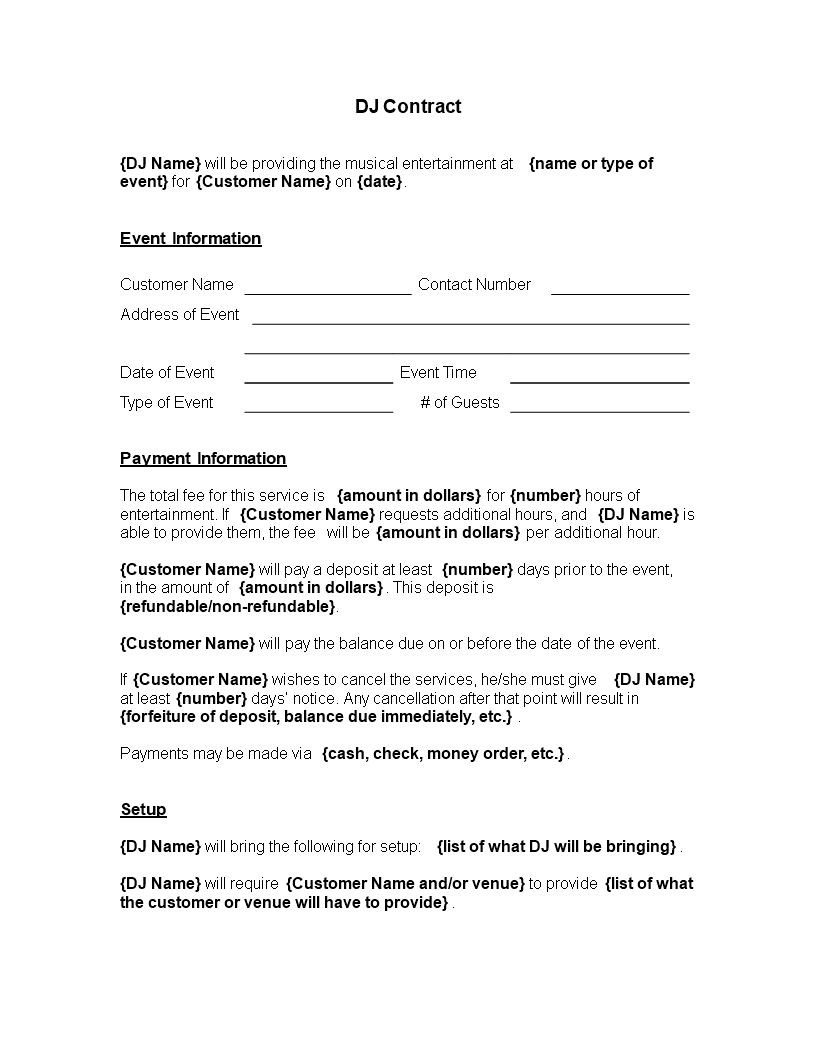Musical entertainment contract
Save, fill-In The Blanks, Print, Done!

Download Musical entertainment contract
Microsoft Word (.doc)Or select the format you want and we convert it for you for free:
- This Document Has Been Certified by a Professional
- 100% customizable
- This is a digital download (34.5 kB)
- Language: English
- We recommend downloading this file onto your computer.
In order to write a music contract agreement, what do you have to do? What is the basic contract for music performances? Our music contract agreement template is easy to follow and customize. It includes all the necessary elements to protect both you and your clients. Get the template now and get started! Download this professional Musical entertainment contract template now!
A Musical Entertainment Contract, also known as a Music Performance Contract or Band Agreement, is a legally binding document that outlines the terms and conditions governing a musical performance or entertainment engagement. This contract is typically used when musicians, bands, or musical performers are hired to provide live music at events, venues, or private functions. It serves to formalize the agreement between the performers and the party or organization hiring them. A well-drafted musical entertainment contract helps ensure that both parties understand their rights, responsibilities, and expectations.
Key components typically included in a Musical Entertainment Contract are as follows:
- Names and Contact Information: The contract should specify the legal names and contact information of both the performer(s) or band and the party hiring them.
- Event Details: This section provides information about the event, including the event name, date, time, venue, and location.
- Scope of Services: Describe in detail the services the performers are expected to provide. This may include the type of music to be performed, the number of sets, the duration of the performance, and any specific songs or repertoire.
- Compensation and Payment Terms: Outline the payment details, including the total compensation, payment schedule (e.g., upfront deposit and final payment), and method of payment (e.g., check, bank transfer).
- Performance Rider: A performance rider can be attached to the contract and include additional requirements, such as technical specifications for sound equipment, stage setup, lighting, or specific hospitality arrangements.
- Cancellation and Rescheduling: Include provisions for the possibility of event cancellation or rescheduling, specifying how fees and deposits will be handled in such cases.
- Equipment and Technical Requirements: Specify the technical requirements for the performance, including sound equipment, instruments, and any other technical needs.
- Rehearsals: Indicate whether there will be rehearsals prior to the event and, if so, the date, time, and location of the rehearsals.
- Sound Check: Define when and how sound checks will be conducted before the performance.
- Travel and Accommodation: If the event requires travel, accommodations, and/or meals for the performers, specify who is responsible for covering these expenses.
- Copyright and Licensing: Address issues related to music copyright and licensing, ensuring that the necessary permissions and licenses have been obtained for any copyrighted material that will be performed.
- Liability and Insurance: Clarify liability and insurance responsibilities for any damage or injuries that may occur during the performance.
- Termination: Outline the conditions under which either party can terminate the contract and the consequences of termination.
- Force Majeure: Include a force majeure clause that addresses unforeseeable circumstances, such as natural disasters or acts of terrorism, which may affect the performance or event.
- Governing Law: Specify the governing law of the contract, which determines the jurisdiction that will have authority over any legal disputes.
- Signatures: The contract should be signed and dated by both parties to indicate their acceptance and commitment to its terms.
It's important for both the performers and the hiring party to thoroughly review and understand the contract before signing it. Legal counsel may be advisable to ensure that the contract complies with relevant laws and adequately protects the interests of both parties. A well-structured Musical Entertainment Contract helps promote a successful and harmonious musical performance experience while minimizing misunderstandings or disputes.
Download this DJ Contract template now and enhance your business!
DISCLAIMER
Nothing on this site shall be considered legal advice and no attorney-client relationship is established.
Leave a Reply. If you have any questions or remarks, feel free to post them below.
Related templates
Latest templates
Latest topics
- GDPR Compliance Templates
What do you need to become GDPR compliant? Are you looking for useful GDPR document templates to make you compliant? All these compliance documents will be available to download instantly... - Google Docs Templates
How to create documents in Google Docs? We provide Google Docs compatible template and these are the reasons why it's useful to work with Google Docs... - IT Security Standards Kit
What are IT Security Standards? Check out our collection of this newly updated IT Security Kit Standard templates, including policies, controls, processes, checklists, procedures and other documents. - Letter Format
How to format a letter? Here is a brief overview of common letter formats and templates in USA and UK and get inspirited immediately! - Google Sheets Templates
How to work with Google Sheets templates? Where to download useful Google Sheets templates? Check out our samples here.
cheese


